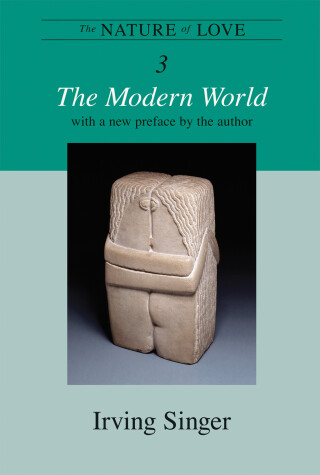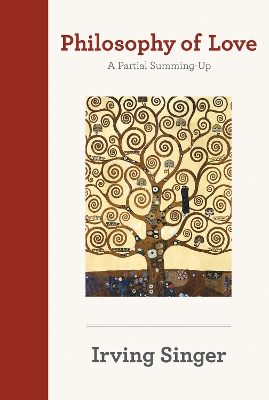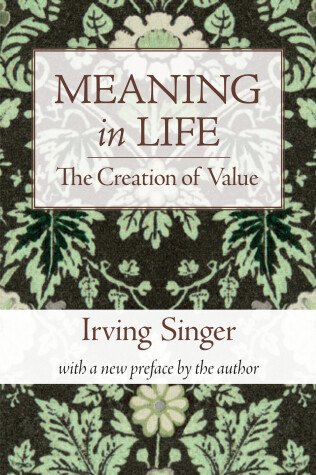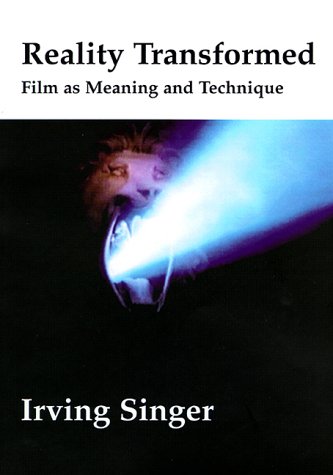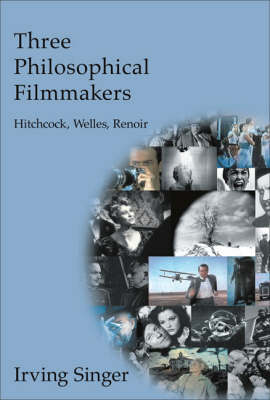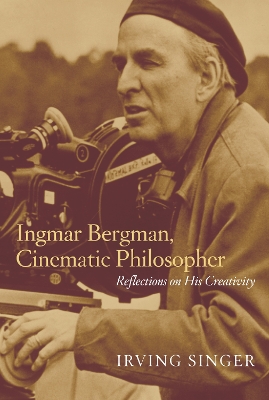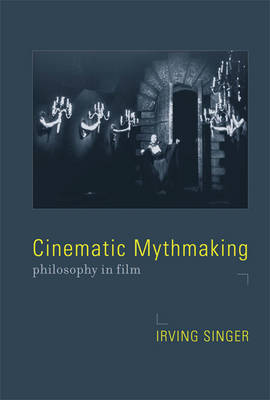Irving Singer Library
8 total works
The final volume of Singer's trilogy discusses ideas about love in the work of writers ranging from Kierkegaard, Nietzsche, and Tolstoy to Freud, Proust, D. H. Lawrence, Shaw, and others in the contemporary world.
Irving Singer's trilogy The Nature of Love has been called "majestic" (New York Times Book Review), "monumental" (Boston Globe), "one of the major works of philosophy in our century" (Nous), "wise and magisterial" (Times Literary Supplement), and a "masterpiece of critical thinking [that] is a timely, eloquent, and scrupulous account of what, after all, still makes the world go round" (Christian Science Monitor).
In the third volume, Singer examines the pervasive dialectic between optimistic idealism and pessimistic realism in modern thinking about the nature of love. He begins by discussing "anti-Romantic Romantics" (focusing on Kierkegaard, Nietzsche, and Tolstoy), influential nineteenth-century thinkers whose views illustrate much of the ambiguity and self-contradiction that permeate thinking about love in the last hundred years. He offers detailed studies of Freud, Proust, Shaw, D. H. Lawrence, and Santayana, and he maps the ideas about love in Continental existentialism, particularly those of Sartre and de Beauvoir. Singer finally envisages a future of cooperation between pluralistic humanists and empirical scientists. This last volume of Singer's trilogy does not pretend to offer the final word on the subject, any more than do most of the philosophers he discusses, but his masterful work can take its place beside their earlier investigations into these vast and complex questions.
In 1984, Irving Singer published the first volume of what would become a classic and much acclaimed trilogy on love. Trained as an analytical philosopher, Singer first approached his subject with the tools of current philosophical methodology. Dissatisfied by the initial results (finding the chapters he had written "just dreary and unproductive of anything"), he turned to the history of ideas in philosophy and the arts for inspiration. He discovered an immensity of speculation and artistic practice that reached wholly beyond the parameters he had been trained to consider truly philosophical. In his three-volume work The Nature of Love, Singer tried to make sense of this historical progression within a framework that reflected his precise distinction-making and analytical background. In this new book, he maps the trajectory of his thinking on love. It is a "partial" summing-up of a lifework: partial because it expresses the author's still unfolding views, because it is a recapitulation of many published pages, because love -- like any subject of that magnitude -- resists a neatly comprehensive, all-inclusive formulation. Adopting an informal, even conversational, tone, Singer discusses, among other topics, the history of romantic love, the Platonic ideal, courtly and nineteenth-century Romantic love; the nature of passion; the concept of merging (and his critique of it); ideas about love in Freud, Schopenhauer, Nietzsche, Dewey, Santayana, Sartre, and other writers; and love in relation to democracy, existentialism, creativity, and the possible future of scientific investigation. Singer's writing on love embodies what he has learned as a contemporary philosopher, studying other authors in the field and "trying to get a little further." This book continues his trailblazing explorations.
An exploration of the sensuous and the passionate, as expressed in operas by Mozart and Beethoven.
Music, language, and drama come together in opera to make a whole that conveys emotional reality. In this book, Irving Singer develops a new mode for understanding and experiencing the operas of Mozart and Beethoven, approaching them not as a musical technician but as a philosopher concerned with their expressive and mythic elements. Using the distinction between the sensuous and the passionate (formulated in Singer's earlier book The Goals of Human Sexuality) as framework for his discussion, Singer explores not only the treatment of love in these operas but also the emotional and intellectual orientation of these two great composers. Singer contrasts the cool sensuality of the Don in Mozart's Don Giovanni with Leonora's passionate love for her husband in Beethoven's Fidelio and compares the erotic playfulness of some of Mozart's letters with Beethoven's fervent (and unsent) letter to "the immortal beloved." Don Giovanni, The Marriage of Figaro, Cosi Fan Tutte, and The Magic Flute all express the conflict between the sensuous and the passionate, but it is only in The Magic Flute, says Singer, that this conflict is resolved. Beethoven, an admirer of The Magic Flute, emulated both its music and its ideology, and produced in Fidelio the greatest of all operas about married love. Written while Singer was also at work on the three-volume The Nature of Love, Mozart and Beethoven can be read as a companion volume to this masterful trilogy and as a forerunner to his later work on philosophy in film.
An acclaimed philosopher views the search for meaning in life as the search for a mode of creativity that will make our lives meaningful.
What is meaning in life? Does anything really matter? How can a life achieve lasting significance? How can we explain the human propensity to struggle for ideals? How is meaning related to contentment, happiness, joy? Is meaning something we discover, or do we create it? What is the nature of value, and what are its sources in human experience? Can there be a meaning in life without religious faith? What is the meaning of death? Is life worth living? What would enable us to have a love of life?
"Meaning in life," writes philosopher Irving Singer, "and the meaning in our own lives, results from creative efforts on our part. It is not a prior reality awaiting our discovery. Though we talk about a 'search' for meaning, what we are seeking is primarily a mode of creativity that will make our lives meaningful." In The Creation of Value, the first volume of his Meaning in Life trilogy, Singer studies the nature of imagination, idealization, and love in the context of humanity's attempt to define itself through the pursuit of meanings and values that it creates. Singer confronts life's most troubling problems: the meaning of death, the presence of anxiety in daily existence, the conditions needed for us to have a life worth living, and the possibility of a love of life in others as well as in ourselves.
The book should be of interest to the general reader as well as students in all fields related to film studies.
Examining the work of Alfred Hitchcock, Orson Welles, and Jean Renoir as it expresses their disparate visions of the human condition.
Although Alfred Hitchcock, Orson Welles, and Jean Renoir do not pontificate about "eternal verities or analytical niceties," as Irving Singer remarks in Three Philosophical Filmmakers, each expresses, through his work, his particular vision of reality. In this study of these great directors, Singer examines the ways in which meaning and technique interact within their different visions.Singer's account reveals Hitchcock, Welles, and Renoir to be not only consummate artists and inspired craftsmen but also sophisticated theorists of film and its place in human experience. They left behind numerous essays, articles, and interviews in which they discuss the nature of their own work as well as more extensive issues. Singer draws on their writings, as well as their movies, to show the pervasive importance of what they did as dedicated filmmakers. Hitchcock used his mastery of contrived devices not as mere formalism divorced from content, Singer notes, but in order to evoke emotional responses that are meaningful in themselves and that matter greatly to millions of people. Singer's discussion of Hitchcock's work analyzes, among other things, his ideas about suspense, romance, and the comic. Singer also makes a detailed comparison of the original Psycho with Gus Van Sant's recent remake. Considering the work of Welles, Singer shows how and why the theme of vanished origins -- "the myth of the past" -- recurs in many of his films, starting with the Rosebud motif in Citizen Kane and continuing much later in his little-known masterpiece The Immortal Story. Expanding upon Renoir's comment that his own films were "always the same film," Singer studies his entire work as a coherent though evolving search for contact and "conversation" with the audience. While recognizing the primacy of technique, Renoir used cinematic artifice in the service of that humanistic aspiration.
Known for their repeating motifs and signature tropes, the films of Ingmar Bergman also contain extensive variation and development. In these reflections on Bergman's artistry and thought, Irving Singer discerns distinctive themes in Bergman's filmmaking, from first intimations in the early work to consummate resolutions in the later movies. Singer demonstrates that while Bergman's output is not philosophy on celluloid, it attains an expressive and purely aesthetic truthfulness that can be considered philosophical in a broader sense.
Through analysis of both narrative and filmic effects, Singer probes Bergman's mythmaking and his reliance upon the magic inherent in his cinematic techniques. Singer traces throughout the evolution of Bergman's ideas about life and death, and about the possibility of happiness and interpersonal love. In the overtly self-referential films that he wrote or directed (The Best Intentions, Fanny and Alexander, Sunday's Children) as well as the less obviously autobiographical ones (including Wild Strawberries, The Seventh Seal, and the triad that begins with Through a Glass Darkly) Bergman investigates problems in his existence and frequently reverts to childhood memories. In such movies as Smiles of a Summer Night, Scenes from a Marriage, and Saraband, Bergman draws upon his mature experience and depicts the troubled relationships between men who are often weak and women who are made to suffer by the damaged men with whom they live. In Persona, Cries and Whispers, and other works, his experiments with the camera are uniquely masterful. Inspecting the panorama of Bergman's art, Singer shows how the endless search for human contact motivates the content of his films and reflects Bergman's profound perspective on the world.
Mythic themes and philosophical probing in film as an art form, as seen in works of Preston Sturges, Jean Cocteau, Stanley Kubrick, and various other filmmakers.
Film is the supreme medium for mythmaking. The gods and heroes of mythology are both larger than life and deeply human; they teach us about the world, and they tell us a good story. Similarly, our experience of film is both distant and intimate. Cinematic techniques-panning, tracking, zooming, and the other tools in the filmmaker's toolbox-create a world that is unlike reality and yet realistic at the same time. We are passive spectators, but we also have a personal relationship with the images we are seeing. In Cinematic Mythmaking, Irving Singer explores the hidden and overt use of myth in various films and, in general, the philosophical elements of a film's meaning. Mythological themes, Singer writes, perform a crucial role in cinematic art and even philosophy itself. Singer incisively disentangles the strands of different myths in the films he discusses. He finds in Preston Sturges's The Lady Eve that Barbara Stanwyck's character is not just the biblical Eve but a liberated woman of our times; Eliza Doolittle in the filmed versions of Shaw's Pygmalion is not just a statue brought to life but instead a heroic woman who must survive her own dark night of the soul. The protagonist of William Wyler's The Heiress and Anieszka Holland's Washington Square is both suffering Dido and an awakened Amazon. Singer reads Cocteau's films-including La Belle et la Bete, Orphee, and The Testament of Orpheus-as uniquely mythological cinematic poetry. He compares Kubrickean and Homeric epics and analyzes in depth the self-referential mythmaking of Federico Fellini in many of his movies, including 81/2. The aesthetic and probing inventiveness in film, Singer shows us, restores and revives for audiences in the twenty-first century myths of creation, of the questing hero, and of ideals-both secular and religious-that have had enormous significance throughout the human search for love and meaning in life.
